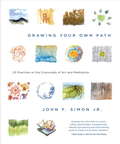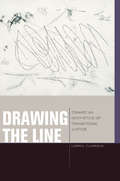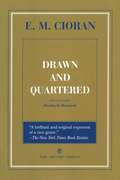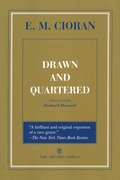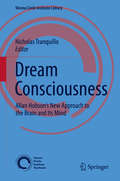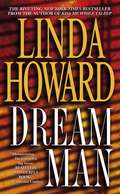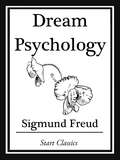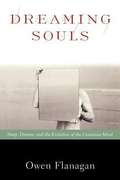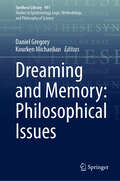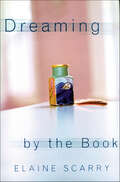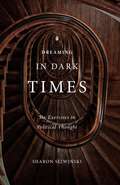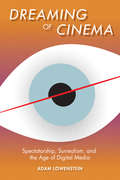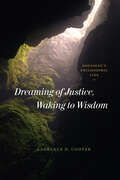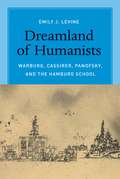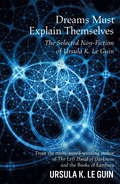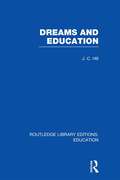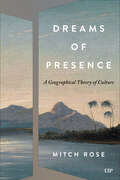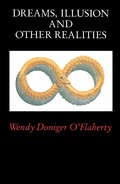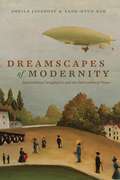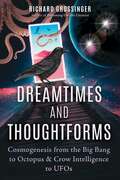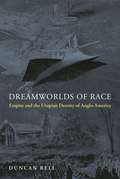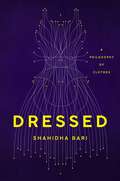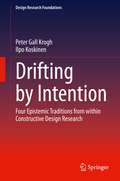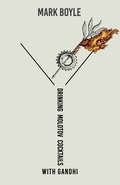- Table View
- List View
Drawing Your Own Path: 33 Practices at the Crossroads of Art and Meditation
by John F. Simon"Drawing Your Own Path is a smart, subtle, sophisticated, compassionate, radically eye-opening and mind-altering guide to creative and artistic liberation. Thank you, John Simon!"--Ruth Ozeki, A Tale for the Time Being"John F. Simon, Jr., widely recognized as an early pioneer in the use of computer-generated imagery in contemporary art, has turned his attention to the act mark-making as a doorway into self-awareness and the essential touchstone of visual creativity. He leads us through a sequence of meditative drawing exercises, and shares insightful, touching anecdotes of his many years of experience as a practicing artist."--Peter Halley, Artist"The mysteries of the mind and universe are coupled with a very practical guide to drawing. It is an unlikely but wonderfully fruitful combination, a step-by-step approach to awareness and art."--Lawrence Rinder, Director, UC Berkeley Art Museum & Pacific Film Archive"John's marvelous artwork emerges from a deeply inspired and intuitive unfolding. His gift of finding one's own creative process is beautifully transmitted in this delightful guide."--Jon Bernie, Ordinary Freedom "Drawing Your Own Path is an invitation to those who have never drawn before and a warm, informative, intelligent and lovely book to read. It offers refreshing, new ways to look at and experience the steps to make drawings today."--Sharon Louden, Artist, Editor of Living and Sustaining a Creative Life Drawing Your Own Path is an account of how multi-media artist John Simon's daily drawing discipline became a meditation practice, and how that meditation illuminated his creative source. A practical guidebook full of Simon's own art, Drawing Your Own Path offers meditators an alternative path to 'just sitting' and offers artists a way to mindfully examine and deepen the source of their creative ideas. Readers are guided through thirty-three meditation and drawing exercises, exploring concentrated looking, mindful sketching, and improvisational awareness, all designed to help practitioners discover the vast creativity within themselves and in their daily lives.From the Trade Paperback edition.
Drawing the Line: Toward an Aesthetics of Transitional Justice (Just Ideas)
by Carrol ClarksonDrawing the Line examines the ways in which cultural, political, and legal lines are imagined, drawn, crossed, erased, and redrawn in post-apartheid South Africa—through literary texts, artworks, and other forms of cultural production. Under the rubric of a philosophy of the limit, and with reference to a range of signifying acts and events, this book asks what it takes to recalibrate a sociopolitical scene, shifting perceptions of what counts and what matters, of what can be seen and heard, of what can be valued or regarded as meaningful.The book thus argues for an aesthetics of transitional justice and makes an appeal for a postapartheid aesthetic inquiry, as opposed to simply a political or a legal one. Each chapter brings a South African artwork, text, speech, building, or social encounter into conversation with debates in critical theory and continental philosophy, asking: What challenge do these South African acts of signification and resignification pose to current literary-philosophical debates?
Drawn and Quartered
by Richard Howard E. M. Cioran Eugene ThackerIn this collection of aphorisms and short essays, E.M. Cioran sets about the task of peeling off the layers of false realities with which society masks the truth. For him, real hope lies in this task, and thus, while he perceives the world darkly, he refuses to give in to despair. He hits upon this ultimate truth by developing his notion of human history and events as "a procession of delusions," striking out at the so-called "Fallacies of Hope." By examining the relationship between truth and action and between absolutes, unknowables, and frauds, Cioran comes out, for once, in favor of being.
Drawn and Quartered
by E. M. Cioran Eugene ThackerIn this collection of aphorisms and short essays, E.M. Cioran sets about the task of peeling off the layers of false realities with which society masks the truth. For him, real hope lies in this task, and thus, while he perceives the world darkly, he refuses to give in to despair. He hits upon this ultimate truth by developing his notion of human history and events as "a procession of delusions," striking out at the so-called "Fallacies of Hope." By examining the relationship between truth and action and between absolutes, unknowables, and frauds, Cioran comes out, for once, in favor of being.
Dream Consciousness
by Nicholas TranquilloThis book presents three lectures by Allan Hobson, entitled "The William James Lectures on Dream Consciousness". The three lectures expose the new psychology, the new physiology and the new philosophy that derive from and support the protoconsciousness hypothesis of dreaming. They review in detail many of the studies on sleep and dreaming conducted since the days of Sigmund Freud. Following the lectures are commentaries written by scholars whose expertise covers a wide range of scientific disciplines including, but not limited to, philosophy, psychology, neurology, neuropsychology, cognitive science, biology and animal sciences. The commentaries each answer a specific question in relation to Hobson's lectures and his premise that dreaming is an altered state of consciousness. Capitalizing on a vast amount of data, the lectures and commentaries provide undisputed evidence that sleep consists of a well-organized sequence of subtly orchestrated brain states that undoubtedly play a crucial function in the maintenance of normal brain functions. These functions include both basic homeostatic processes necessary to keep the organism alive as well as the highest cognitive functions including perception, decision making, learning and consciousness.
Dream Man
by Linda HowardHad she finally met the man she longed for...or was she dreaming? Marlie Keen was trying to lead a quiet, ordinary life. She thought the knowing -- the clairvoyance that allowed her to witness crimes as they happened -- had been destroyed in the nightmare of her past. Then one night it returned with a vengeance, and she desperately needed to find someone to make it stop. Detective Dane Hollister of the Orlando police department had never met anyone like Marlie. He had doubts about her clairvoyance, but there was no doubt how much he desired her. Her soft, sweet scent set his blood afire, and he wanted to wrap her in his arms and chase the sadness from her eyes. To Marlie, Dane was all heat and hard muscle, and he made her body come alive as it never had before. But not even she could foresee where their passion would lead: a hungry quest for the elusive, dreamy ecstasies of love...and a dangerous journey into the twisted mind of a madman who would threaten their happiness and their lives....
Dream Psychology
by Sigmund FreudDream Psychology has been described as the key to Freud's works and, in fact, the key to all modern psychology, as well as a great study of psychoanalysis for beginners. But it is an excellent guide to professionals also. This book shows how your dreams have a meaning and how they can be interpretted. This interprettation of your dreams explains the fears and anxieties as well as the wishes and desires of your unconscious mind.
Dreaming Souls
by Owen FlanaganAn informative review of current research on sleep and dreams and a new theory about the nature and function of dreaming, presented with clarity, wit, and finesse. Flanagan (philosophy, experimental psychology, and neurobiology/Duke Univ.), editor of the Philosophy of Mind Series, to which the present work belongs, brings insights from philosophy, phenomenology, evolutionary biology, psychology and psychiatry, anthropology, sociology, and neuroscience to his theory of dreams.
Dreaming and Memory: Philosophical Issues (Synthese Library #491)
by Kourken Michaelian Daniel GregoryThis edited volume is the first systematic philosophical investigation of the complex and multifarious relationships between dreaming and memory. Featuring fifteen contributions by leading researchers, it explores a range of issues that arise when dreaming and memory are considered together. What does one remember when one remembers what one dreamt, and what is it for a memory of a dream to be accurate? What are the phenomenological, cognitive, and epistemic similarities and dissimilarities between dreaming and remembering? How does the self figure in dreams and memories? The book will serve as an indispensable resource both for philosophers interested in dreaming or memory and for their philosophically-minded colleagues in empirical disciplines and will provide an invaluable starting point for advanced students in need of a snapshot of the state of the art in philosophical research on dreaming and memory. Chapters [2], [10] and [16] are available open access under a Creative Commons Attribution 4.0 International License via link.springer.com
Dreaming by the Book
by Elaine ScarryA pathbreaking work about the way literature teaches us to use our imagination.We often attribute to our imaginative life powers that go beyond ordinary perception or sensation. In Dreaming by the Book, the noted scholar Elaine Scarry explores the apparently miraculous but in fact understandable processes by which poets and writers confer those powers on us: how they teach us the work of imaginative creation.Writers from Homer to Heaney, Scarry argues, instruct us in the art of mental composition even as their poems progress: just as painters understand paint, composers musical sounds, and sculptors stone or metal, verbal artists understand and deploy the only material in which their creations will get made - the backlit tissue of the human imagination. In her brilliant synthesis of cognitive psychology, literary criticism, and philosophy, she explores the five principal formal practices by which writers bring things to life for their readers; she calls them radiant ignition, rarity, dyadic addition and subtraction, stretching, and floral supposition. The transforming power of these mental practices can be seen in their appearance in great literature, of course, but also in applying them to - and watching how they revise - our own daydreams.Dreaming by the Book is not only an utterly original work of literary analysis but a sequence of on-the-spot mental experiments.
Dreaming in Dark Times: Six Exercises in Political Thought
by Sharon SliwinskiWhat do dreams manage to say—or indeed, show—about human experience that is not legible otherwise? Can the disclosure of our dream-life be understood as a form of political avowal? To what does a dream attest? And to whom? Blending psychoanalytic theory with the work of such political thinkers as Hannah Arendt and Michel Foucault, Sharon Sliwinski explores how the disclosure of dream-life represents a special kind of communicative gesture—a form of unconscious thinking that can serve as a potent brand of political intervention and a means for resisting sovereign power. Each chapter centers on a specific dream plucked from the historical record, slowly unwinding the significance of this extraordinary disclosure. From Wilfred Owen and Lee Miller to Frantz Fanon and Nelson Mandela, Sliwinski shows how each of these figures grappled with dream-life as a means to conjure up the courage to speak about dark times. Here dreaming is defined as an integral political exercise—a vehicle for otherwise unthinkable thoughts and a wellspring for the freedom of expression.Dreaming in Dark Times defends the idea that dream-life matters—that attending to this thought-landscape is vital to the life of the individual but also vital to our shared social and political worlds.
Dreaming of Cinema
by Adam LowensteinAdam Lowenstein argues that Surrealism's encounter with film can help redefine the meaning of cinematic spectatorship in an era of popular digital entertainment.
Dreaming of Cinema: Spectatorship, Surrealism, and the Age of Digital Media (Film and Culture Series)
by Adam LowensteinVideo games, YouTube channels, Blu-ray discs, and other forms of "new" media have made theatrical cinema seem "old." A sense of "cinema lost" has accompanied the ascent of digital media, and many worry film's capacity to record the real is fundamentally changing. Yet the Surrealist movement never treated cinema as a realist medium and understood our perceptions of the real itself to be a mirage. Returning to their interpretation of film's aesthetics and function, this book reads the writing, films, and art of Luis Buñuel, Salvador Dalí, Man Ray, André Breton, André Bazin, Roland Barthes, Georges Bataille, Roger Caillois, and Joseph Cornell and recognizes their significance for the films of David Cronenberg, Nakata Hideo, and Atom Egoyan; the American remake of the Japanese Ring (1998); and a YouTube channel devoted to Rock Hudson. Offering a positive alternative to cinema's perceived crisis of realism, this innovative study enriches the meaning of cinematic spectatorship in the twenty-first century.
Dreaming of Justice, Waking to Wisdom: Rousseau's Philosophic Life
by Laurence D. CooperA surprising look at how Rousseau defended the philosophic life as the most natural and best of lives. Dreaming of Justice, Waking to Wisdom reveals what could be thought of as the capstone of Rousseau’s thought, even if that capstone has been nearly invisible to readers. Despite criticizing philosophy for its corrosive effects on both natural goodness and civic virtue, Rousseau, argues Laurence D. Cooper, held the philosophic life as an ideal. Cooper expertly unpacks Rousseau’s vivid depiction of the philosophic life and the case for that life as the most natural, the freest, or, in short, the best or most choice-worthy of lives. Cooper focuses especially on a single feature, arguably the defining feature of the philosophic life: the overcoming of the ordinary moral consciousness in favor of the cognitivist view of morality. Cooper shows that Rousseau, with his particular understanding and embrace of the philosophic life, proves to be a kind of latter-day Socratic. Thorough and thought-provoking, Dreaming of Justice, Waking to Wisdom provides vital insight into Rousseau.
Dreamland of Humanists: Warburg, Cassirer, Panofsky, and the Hamburg School
by Emily J. LevineDeemed by Heinrich Heine a city of merchants where poets go to die, Hamburg was an improbable setting for a major intellectual movement. Yet it was there, at the end of World War I, at a new university in this commercial center, that a trio of twentieth-century pioneers in the humanities emerged. Working side by side, Aby Warburg, Ernst Cassirer, and Erwin Panofsky developed new avenues in art history, cultural history, and philosophy, changing the course of cultural and intellectual history in Weimar Germany and throughout the world. In Dreamland of Humanists, Emily J. Levine considers not just these men, but the historical significance of the time and place where their ideas took form. Shedding light on the origins of their work on the Renaissance and the Enlightenment, Levine clarifies the social, political, and economic pressures faced by German-Jewish scholars on the periphery of Germany's intellectual world. By examining the role that context plays in our analysis of ideas, Levine confirms that great ideas--like great intellectuals--must come from somewhere.
Dreams Must Explain Themselves: The Selected Non-Fiction of Ursula K. Le Guin
by Ursula K. Le Guin'By turns sharp, funny and insightful, high-minded but never mean-spirited, the book embodies its author's lifelong quest for freedom: freedom as a woman, freedom to write what she pleased, freedom to like what she liked. Genre fiction - and literature in general - has lost not just one of its brightest exponents but one of its bolshiest champions.' FINANCIAL TIMES'Excellent' CHOICE'Le Guin is one of the singular speculative voices of our future, thanks to her knack for anticipating issues of seminal importance to society' TLSUrsula K. Le Guin has won or been nominated for over 200 awards for her fiction, including the Hugo, Nebula, World Fantasy and SFWA Grand Master Awards. She is the acclaimed author of the Earthsea sequence and The Left Hand of Darkness - which alone would qualify her for literary immortality - as well as a remarkable body of short fiction, including the powerful, Hugo-winning 'The Ones Who Walk Away from Omelas' and the masterpiece of anthropological and environmental SF 'The Word for World is Forest' - winner of the Hugo Award for best novella. But Ursula Le Guin's talents do not stop at fiction. Over the course of her extraordinary career, she has penned numerous essays around themes important to her: anthropology, environmentalism, feminism, social justice and literary criticism to name a few. She has responded in detail to criticism of her own work and even reassessed that work in the context of such critiques. This selection of the best of Le Guin's non-fiction shows an agile mind, an unparalleled imagination and a ferocious passion to argue against injustice. In 2014 Ursula Le Guin was awarded the National Book Foundation's Medal for Distinguished Contribution to American Letters, and her widely praised acceptance speech is one of the highlights of this volume, which shows that one of modern literature's most original voices is also one of its purest consciences.
Dreams and Education (Routledge Library Editions: Education)
by J C HillWritten at a time when the psychology of education was still in its infancy, this volume explains the scientific interpretation of dreams. The importance of the Dream Mind in normal behaviour, and in the production and appreciation of literature and art, is illustrated by numerous examples. Educational methods in the home and at school are reviewed in the light of this ‘new’ knowledge.
Dreams of Presence: A Geographical Theory of Culture
by Mitch RoseThroughout the twentieth century, the question of culture was a central pillar of social scientific thought. Today, however, the concept has disappeared from the academic landscape. Despite pressing political debates about culture wars, identity politics, cultural appropriation, and nativism, the concept of culture is no longer seen as a credible explanatory tool. Dreams of Presence provides a novel theoretical approach to the question of culture and will be of use to geographers, anthropologists, sociologists, and social theorists grappling to understand why culture continues to be a dominant political force in our contemporary world. Drawing on Heidegger, Levinas, Derrida, and Žižek, Mitch Rose provides an existential, rather than sociological, account of culture, conceptualizing it as a refuge where subjects endeavour to establish ownership over a life that perpetually eludes them. The book argues that culture is a claim; not something subjects ever have but something they desire; not something properly present but a dream of presence: an imagination of identity we cultivate, care for, and materially build in order to assure ourselves that we are sovereign, self-standing beings.
Dreams, Illusion, and Other Realities
by Wendy Doniger O'Flaherty"Wendy Doniger O'Flaherty . . . weaves a brilliant analysis of the complex role of dreams and dreaming in Indian religion, philosophy, literature, and art. . . . In her creative hands, enchanting Indian myths and stories illuminate and are illuminated by authors as different as Aeschylus, Plato, Freud, Jung, Kurl Gödel, Thomas Kuhn, Borges, Picasso, Sir Ernst Gombrich, and many others. This richly suggestive book challenges many of our fundamental assumptions about ourselves and our world."—Mark C. Taylor, New York Times Book Review "Dazzling analysis. . . . The book is firm and convincing once you appreciate its central point, which is that in traditional Hindu thought the dream isn't an accident or byway of experience, but rather the locus of epistemology. In its willful confusion of categories, its teasing readiness to blur the line between the imagined and the real, the dream actually embodies the whole problem of knowledge. . . . [O'Flaherty] wants to make your mental flesh creep, and she succeeds."—Mark Caldwell, Village Voice
Dreamscapes of Modernity: Sociotechnical Imaginaries and the Fabrication of Power
by Sheila Jasanoff Sang-Hyun KimDreamscapes of Modernity offers the first book-length treatment of sociotechnical imaginaries, a concept originated by Sheila Jasanoff and developed in close collaboration with Sang-Hyun Kim to describe how visions of scientific and technological progress carry with them implicit ideas about public purposes, collective futures, and the common good. The book presents a mix of case studies--including nuclear power in Austria, Chinese rice biotechnology, Korean stem cell research, the Indonesian Internet, US bioethics, global health, and more--to illustrate how the concept of sociotechnical imaginaries can lead to more sophisticated understandings of the national and transnational politics of science and technology. A theoretical introduction sets the stage for the contributors' wide-ranging analyses, and a conclusion gathers and synthesizes their collective findings. The book marks a major theoretical advance for a concept that has been rapidly taken up across the social sciences and promises to become central to scholarship in science and technology studies.
Dreamtimes and Thoughtforms: Cosmogenesis from the Big Bang to Octopus and Crow Intelligence to UFOs
by Richard Grossinger• Examines animal intelligences within a greater evolutionary context, detailing in particular the remarkable intelligence of crows and octopuses • Looks at the Australian Aborigine Dreamtime as an attempt to understand the combined geological and geomantic landscape • Investigates a range of ideas as they relate to the intersections of consciousness and reality, including reincarnation, past-life memories, ghosts, and UFOs From the origins of the cosmos to the microbiome, COVID-19 pandemic, UFOs, and the shapeshifting of octopuses and language of crows, Richard Grossinger traverses the mysteries and enigmas that define our universe and personal reality. Beginning his narrative with the Big Bang, origin of the Milky Way, and birth of our solar system, Grossinger offers a chronology of Earth&’s geological, climatological, biological, and sociological evolution, leading to the current environmental and psychospiritual crisis. He explores the origin of cell life, RNA-DNA, and larger biomes, detailing in particular the remarkable intelligence of crows and octopuses. He uses the Australian Aborigine Dreamtime to understand landscapes as thoughtforms. He then offers reimaginings, from the perspective of &“dreamings,&” of a wide variety of animals, including tardigrades, llamas, sea turtles, pigeons, bees, and coyotes. Examining the scientific dilemmas and paradoxes of consciousness, time, and quantum entanglement, Grossinger carries these into the range of issues around reincarnation, past-life memories, messages from the afterlife, and ghosts. Sharing exercises from his personal practice, Grossinger makes a distinction between the Buddhist description of reality and how Buddhist practitioners create an operating manual for the universe and an assured path of salvation. The author then examines UFOs and their connections to elementals, fairies, and cryptids in terms of psychoids, Jung&’s term for transconscious processes that enter our world as autonomous entities. Taking the reader on a journey through the seen and unseen universe, from the Big Bang to the imaginal landscape of Dreamtime, Grossinger shows that matter is infused with spirit from its very beginning.
Dreamworlds of Race: Empire and the Utopian Destiny of Anglo-America
by Duncan BellHow transatlantic thinkers in the late nineteenth and early twentieth centuries promoted the unification of Britain and the United StatesBetween the late nineteenth century and the First World War an ocean-spanning network of prominent individuals advocated the unification of Britain and the United States. They dreamt of the final consolidation of the Angloworld. Scholars, journalists, politicians, businessmen, and science fiction writers invested the “Anglo-Saxons” with extraordinary power. The most ambitious hailed them as a people destined to bring peace and justice to the earth. More modest visions still imagined them as likely to shape the twentieth century. Dreamworlds of Race explores this remarkable moment in the intellectual history of racial domination, political utopianism, and world order.Focusing on a quartet of extraordinary figures—Andrew Carnegie, W. T. Stead, Cecil J. Rhodes, and H. G. Wells—Duncan Bell shows how unionists on both sides of the Atlantic reimagined citizenship, empire, patriotism, race, war, and peace in their quest to secure global supremacy. Yet even as they dreamt of an Anglo-dominated world, the unionists disagreed over the meaning of race, the legitimacy of imperialism, the nature of political belonging, and the ultimate form and purpose of unification. The racial dreamworld was an object of competing claims and fantasies. Exploring speculative fiction as well as more conventional forms of political writing, Bell reads unionist arguments as expressions of the utopianism circulating through fin-de-siècle Anglo-American culture, and juxtaposes them with pan-Africanist critiques of racial domination and late twentieth-century fictional narratives of Anglo-American empire.Tracing how intellectual elites promoted an ambitious project of political and racial unification between Britain and the United States, Dreamworlds of Race analyzes ideas of empire and world order that reverberate to this day.
Dressed: A Philosophy of Clothes
by Shahidha BariPerfect for readers of Women in Clothes, this beautifully designed philosophical guide to fashion explores art, literature, and film to uncover the hidden meaning of a well-chosen wardrobe.We all get dressed. But how often do we pause to think about what our clothes say? When we dress ourselves, we are presenting to the world an essence of who we are, who we want to be.Dressed ranges freely from suits to suitcases, from Marx's coat to Madame X's gown. Through art and literature, film and philosophy, philosopher Shahidha Bari unveils the surprising personal implications of what we choose to wear. The impeccable cut of Cary Grant's suit projects masculine confidence, just as Madonna's oversized denim jacket and her armful of orange bangles loudly announces big ambition. How others dress tells us something fundamental about them -- we can better understand how people live and what they think through their garments. Clothes tell our stories.Dressed is the thinking person's fashion book. In baring the hidden power of clothes in our culture and our daily lives, Bari reveals how our outfits not only cover our bodies but also reflect our minds.
Drifting by Intention: Four Epistemic Traditions from within Constructive Design Research (Design Research Foundations)
by Peter Gall Krogh Ilpo KoskinenConstructive design research, is an exploratory endeavor building exemplars, arguments, and evidence. In this monograph, it is shown how acts of designing builds relevance and articulates knowledge in combination. Using design acts to build new knowledge, invite reframing of questions and new perceptions to build up. Respecting the emergence of new knowledge in the process invite change of cause and action. The authors' term for this change is drifting; designers drift; and they drift intentionally, knowing what they do. The book details how drifting is a methodic practice of its own and provides examples of how and where it happens. This volume explores how to do it effectively, and how it depends on the concept of knowledge. The authors identify four epistemic traditions in constructive design research. By introducing a Knowledge/Relevance model they clarify how design experiments create knowledge and what kinds of challenges and contributions designers face when drifting. Along the lines of experimental design work the authors identify five main ways in which constructive experiments drift. Only one of them borrows its practices from experimental science, others build on precedents including arts and craft practices. As the book reveals, constructive design research builds on a rich body of research that finds its origins in some of the most important intellectual movements of 20th century. This background further expands constructive design research from a scientific model towards a more welcoming understanding of research and knowledge. This monograph provides novel actionable models for steering and navigating processes of constructive design research. It helps skill the design researcher in participating in the general language games of research and helps the design researcher build research relations beyond the discipline.
Drinking Molotov Cocktails with Gandhi
by Mark BoyleMore than ever, people are longing for deep and meaningful change. Another world is not only possible; it is essential. Yet despite our creative and determined efforts to attain social justice and ecological sustainability, our global crises continue to deepen.In Drinking Molotov Cocktails with Gandhi, best-selling author Mark Boyle argues that our political and economic system has brought us to the brink of climate catastrophe, ransacking ecosystems and unraveling communities for the benefit of the few at the expense of the many. He makes a compelling case that we must "rewild" the political landscape, as history teaches us that positive social change has always been wrought by movements prepared to use any means available.The time has come for pacifists, revolutionaries, and freedom fighters to work together for the creation of a world worth sustaining. Eloquent, visionary, and beautifully written, this incendiary manifesto strikes at the heart of the world's crises and reframes our understanding of how to solve them, signaling a turning point in our journey towards an ecologically just society.The three R's of the climate change generation--reduce, reuse, and recycle--are long overdue for an upgrade .Welcome to resist, revolt, rewild.Mark Boyle is the author of The Moneyless Man and The Moneyless Manifesto. He lived completely without money for three years, and is a director of the global sharing community streetbank.com.
